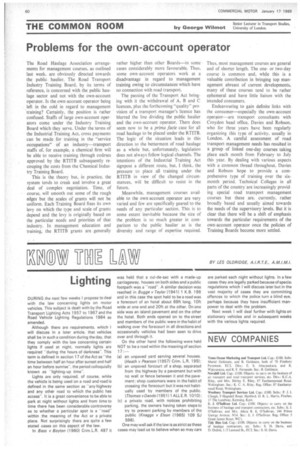Problems for the own-account operator
Page 62

If you've noticed an error in this article please click here to report it so we can fix it.
by George Wilmot Liniversity of London.
The Road Haulage Association arrangements for management courses, as outlined last week, are obviously directed towards the public. haulier. The Road Transport Industry Training Board, by its terms of reference, is concerned with the public haulage sector and not with the own-account operator. Is the own-account operator being .left in the cold in regard to management training? Certainly, the position is rather confused. Staffs of large own-account operators come under the Industry Training Board which they serve. Under the terms of the Industrial Training Act, cross payments can be made for training in the "service occupations" of an industry—transport staffs of, for example, a chemical firm will be able to receive training through courses approved by the RTITB subsequently recouping the costs from the Chemical Industry Training Board.
This is the theory but, in practice, the system tends to creak and involve a great deal of complex negotiation. Time, of course, will smooth out some of the rough edges but the scales of grants will not be uniform. Each Training Board fixes its own levy on which the type and scale of grants depend and the levy is originally based on the particular needs and priorities of that industry. In management education and training, the RTITB grants are ,generally rather higher than other Boards—in some cases considerably more favourable. Thus, some own-account operators work at a disadvantage in regard to management training owing to circumstances which have no connection with road transport.
The passing of the Transport Act bringing with it the withdrawal of A, B and C licences, plus the forthcoming "quality" provision of a transport manager's licence has blurred the line dividing the public haulier and the own-account operator. There does seem now to be a prima facie case for all road haulage to be placed under the RTITB. The logic of the situation leads in this direction to the betterment of road haulage as a whole but, unfortunately, legislation does not always follow logical channels. The intentions of the Industrial Training Act signpost a different route, but, I think, the pressure to place all training under the RTITB in view of the changed circumstances, will be difficult to resist in the future.
Meanwhile, management courses available to the own-account operator are very varied and few are specifically geared to the needs of any particular section. This is to some extent inevitable because the size of the problem is so much greater in comparison to the public haulier as is the diversity and range of expertise required.
Thus, most management courses are general and of shorter length. The oneor two-day course is common and, while this is a valuable contribution in bringing top management abreast of current developments, many of these courses tend to be rather ephemeral and have little liaison with the intended consumers.
Endeavouring to gain definite links with the consumer—especially the own-account operator—are transport consultants with Croydon head office, Davies and Robson, who for three years have been regularly organizing this type of activity, usually in London. A careful assessment of road transport management needs has resulted in a group of linked one-day courses taking place each month from February to July this year. By dealing with various aspects with a common thread throughout, Davies and Robson hope to provide a comprehensive type of training over the sixmonth period. Technical Colleges in all parts of the country'are increasingly providing special road transport management courses but these are, currently, rather broadly based and usually aimed towards the needs of the supervisory levels. But it is clear that there will be a shift of emphasis towards the particular requirements of the own-account operator once the policies of Training Boards become more settled.








































































































